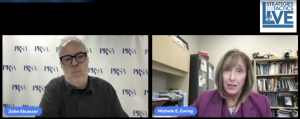Each September, PRSA recognizes Ethics Month as a way to bring increased attention to the core foundation of the communications profession. Programming this month several webinars, including “Bots, Misrepresentation and More: Navigating Ethical Dilemmas in Digital Communication” on Sept. 27 from 3-4 p.m. Please visit prsa.org/ethics for updates on programming.
A recent KPMG survey found that 40% of U.S. consumers don’t trust companies to use their data ethically. Amid lapses and breaches, should communicators sound alarms about the potential misuse of people’s data?
As PR professionals, “We should be working with senior leadership to first ensure that how data is being accessed and protected is legally compliant in your state, your country and your industry,” said Michele E. Ewing, APR, Fellow PRSA. “Then we can apply our existing ethical code of principles to make sure we’re ethically compliant.”
 Ewing was the guest on the Sept. 22 episode of S&T Live, PRSA’s monthly livestream on LinkedIn that takes readers of Strategies & Tactics deeper into the stories they find in the paper. She is an associate professor and public relations-sequence coordinator in the School of Media & Journalism at Kent State University in Kent, Ohio.
Ewing was the guest on the Sept. 22 episode of S&T Live, PRSA’s monthly livestream on LinkedIn that takes readers of Strategies & Tactics deeper into the stories they find in the paper. She is an associate professor and public relations-sequence coordinator in the School of Media & Journalism at Kent State University in Kent, Ohio.
She is also a member of PRSA’s Board of Ethics and Professional Standards (BEPS). To coincide with Ethics Month, she wrote an article for the September issue of Strategies & Tactics titled “Using Data Ethically to Inform PR Strategies.” Before becoming a college professor, Ewing had been a public relations counselor in an agency environment for more than 15 years.
Do people know what they’re giving up?
As one example of data being used in a potentially unethical way, fitness apps can collect personal information about their users, without the users knowing it. That data can then be sold to data brokers and used to target consumers with certain messages.
John Elsasser, editor-in-chief of Strategies & Tactics and host of S&T Live, asked Ewing how communicators can ensure their companies follow ethical guidelines for data usage.
“Overall, it’s about creating policies that set a standard for the organization — not just [regarding] communications data, but data across the organization,” Ewing said. Communicators should recognize ethical challenges that relate to their business or their clients’ businesses.
PR pros should also make sure audiences are clearly informed about how their data is accessed and used, she said.
“That’s where public relations plays a key role, because we are the communicators,” Ewing said. “We need to be transparent and honest. We need to be sure that audiences understand when they’re giving up the rights to their data.”
Even as technology introduces potential new ethical dilemmas for businesses and communicators (algorithmic bias for example), communicators can still start with PRSA’s Code of Ethics for guidance on making ethical decisions, she said. “Honesty, transparency and fairness all apply here.”
You can watch the playback via this link.
[Photo credit: oatawa]

